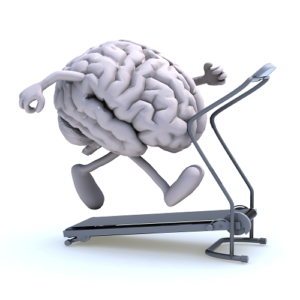Exercise
Keep your brain hummingOverview
“Walking is the best possible exercise. Habituate yourself to walk very far.”
― Thomas Jefferson
It may seem almost cliche’ by now to hear how important exercise is for general well being. But for people with ADHD, exercise is doubly important. Not only is it critical for general brain health, but it increases dopamine and helps quiet the brain. While drugs have become better over the years, until there is a patch or implant for consistent and sustained release, there is also some degree of ebb and flow of drugs regulating your brain chemistry. With exercise, you can help maintain your own brain chemistry more consistently most anytime, anywhere, and experience some benefit.
 How exercise helps
How exercise helps
While there is still much research to be done, most researchers agree that people with ADHD have reduced dopamine levels. Dopamine helps your brain send signals among all your different neurons (think of a telephone network, or even a domino array), helps achieve focus, and helps your brain experience reward. Exercise works similar to ADHD drugs [link to drugs page], arguably better and more consistently by addressing both dopamine and serotonin at the same time. Beyond that, increasing evidence points to connections between the gut and ADHD [link to guts page]. And exercise helps with the gut biome as well.
Why exercise works
Exercise, simply put, helps produce the chemicals your brain craves. Many people experience ADHD as a feeling of either overstimulation (hyperactivity) or a certain blankness in the brain. Getting the right mix of neurotransmitters can help maintain focus and get rid of excess energy. If you already incorporate exercise regularly, you may have experienced the so called “runners high” – which is a healthy release of dopamine.That’s a lofty goal for most, but if you translate those effects into what you can achieve day-to-day, you can understand the benefits.
What to do
Before you start any exercise regimen, make sure you’ve checked in with a physician. If you haven’t exercised for a while or have never exercised, think of this less like a chore and more like a treat. Find something you enjoy doing. Go for a walk around the block after a meal, which has the added benefit of helping digestion, which again, is connected to your gut. If you wish you had more social time, find a social sport, such as racquetball or basketball. Go dancing. Don’t worry about becoming an athlete though – just find something that gets you moving regularly. Celebrate what your body can do – don’t stress about what it can’t do, the same way you should celebrate your own neurodiversity – what your brain can do. Activities such as yoga and the martial arts may help you learn some meditation [link to meditation page] techniques on top of the benefits of the exercise itself. But start slow, find activities you like enough to keep doing them, and keep it up.
